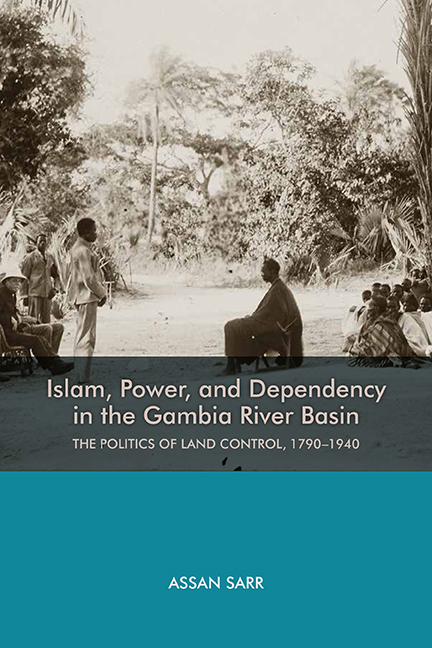Book contents
4 - The End of Soninke Rule
from Part 2 - The End of the Old Order
Published online by Cambridge University Press: 26 April 2018
Summary
Overthrow of the Soninke Rulers
When a land dispute between the south bank villages of Sankandi and Jattaba intensified in 1899, the reigning Soninke king, mansa Koto, assisted by his elders, Tumani Messeng and Bakary Kumba Santang, held a meeting in Sankandi. At the meeting, mansa Koto decided that the land belonged to Jattaba. The residents of Sankandi strongly rejected the verdict, on the basis that the mediators were not fair. The elders of Sankandi insisted that the land was theirs and that they were determined to “go to war” if it was not restored to them. Later that year, the dispute was referred to Traveling Commissioner Cecil Sitwell, the representative of the new colonial authority. According to oral informants from Sankandi, when matters reached the commissioner, he again gave his judgment in favor of Jattaba. Some say, however, that during his first judgment, the commissioner had ruled that the disputed property should be used in rotation between the two villages—Sankandi would use it for a year and pass it on to Jattaba for the following year. Dari Bana Darboe, Sankandi's alkalo, and his close associates, again refused to accept Sitwell's judgment.
Subsequently, the commissioner decided to travel to Sankandi to deal with the problem in person. On this trip, Assistant Commissioner Silva, mansa Koto, and six police constables accompanied the traveling commissioner to the Kiang districts. When they arrived in Sankandi, they ordered the village elders to meet them at the outskirts of the village to discuss the problem. This outraged the elders of Sankandi, who believed that mansa Koto and the European commissioner did not accord them appropriate respect, because the proper place to settle a problem was in a bantango or bantaba (i.e., the village meeting ground). Consequently, Darboe and his council declined to meet the commissioner and his entourage. In an attempt to force the defiant population of Sankandi to attend the meeting, the commissioner, his assistant, and the six police constables were killed. Mansa Koto also sustained severe injuries, and died later.
- Type
- Chapter
- Information
- Islam, Power, and Dependency in the Gambia River BasinThe Politics of Land Control, 1790–1940, pp. 113 - 136Publisher: Boydell & BrewerPrint publication year: 2016

